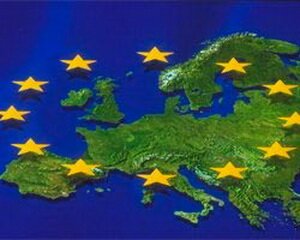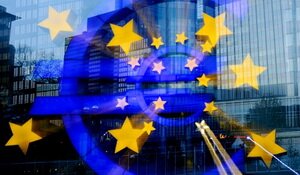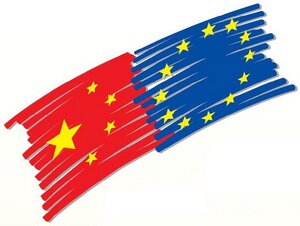
The main problematic aspect of the current development of the European space, directly influencing the situation around Ukraine, is the sharpening of the finance-economic problems in the EU countries. Thus, according to the estimations of the European Commission, in 2012 the decrease of the gross domestic product in the countries of the European Area is forecasted to be 0.4 %, and of the EU in the whole-0.3 % of GDP. The most complicated situation is in Greece, Italy, Spain, Portugal, Iceland, Romania, Hungary and Slovenia, which actually brought in the main negative potential into the economic situation of the EU. In particular, in 2012 the decrease of the GDP of Greece is expected at the level of 3 %, of Italy — 2.3 %, Spain — 1.4 %, Hungary — 1.2%, Slovenia — 2.2 %.

In a somewhat better situation remain the leaders of the European Union — Federal Republic of Germany, Great Britain and France, and some other countries — Norway, Sweden, Finland and Poland, even though they are also in a not simple economic situation. Thus, lowering of the consumption indexes of the FRG‘s main European partners led to decreasing of the volumes of the German foreign trade and, as a result, to falling of the budget incomes of the country. In particular, in September 2012 alone, the mentioned above index decreased by 3.4 % to 91.7 billion Euro (the greatest decreasing since the November of 2009). In its turn, since 2008, the decreasing of the GDP of France made about 4 %, and the part of the country in the world export got shortened from 5 to 3 %. In the whole the mentioned above circumstances have led to a number of considerable negative consequences both, for certain countries of the EU, and for the EU in general. First of all it concerns the critical growth of the state debts of a number of the EU countries (in the first turn Greece), that has led to a real threat of their default, and as a result, to damaging the whole financial system of the European Union.

In its turn, all the mentioned above has created the threat of the disintegration of the whole Euro Area, which can happen in the case of giving up the common European currency by the leading members of the EU for the sake of securing their own financial stability or in the case of a forced excluding the countries with the most problematic economies from the single European currency market.
Meanwhile, breaking off of the existing financial connections among the EU countries will inevitably become a catalyst of the further stagnation of the European economy and a deep crisis of the European Union. The result of it will be a real threat of the political split of the EU on the ground of the mentioned above problems. Actually, elements of such a scenario are already taking place, and this causes a great concern of the EU’s authorities who are taking urgent measures for overcoming the crisis processes. Some EU countries are taking their own anti-crisis measures too.
In general anti-crisis measures include a wide complex of organizing, economic, financial and political actions, which could be reduced to a few main directions, according to their practical meaning and forms of realization.
Thus, on the level of the European Union there have been achieved agreements on reducing budget expenses in the EU member-countries, which has to decrease the volumes of their state debts, and to create financial reserves for helping out the countries being in the hardest economic situation. The realization of the mentioned above decisions is being carried out under the control of the European Commission, who has the right to use sanctions against the breakers of the financial discipline within the framework of the EU. One of the main donors of the reserve funds is Germany, which maintains quite strong finance-economic positions.
On the national level the EU member countries are making their own anti-crisis efforts, including: saving money (first of all, by reducing the levels of financing defense and social programs); raising taxes; involving foreign credits and investments from countries in a more stable economic situation, like China for one; widening their trade-economic cooperation outside the EU, with China, India, countries of South America and Russia included.
According to the European experts, the mentioned above measures have already allowed to create the preconditions for the EU’s getting out of the finance-economic crisis. At the same time, their realization has led to a number of new problems of both, situations and long-term character.
Thus, the constrained reduction of social expanses in the EU countries (lowering of salaries, pensions, social help and fringe benefits included), and raising of taxes caused a great negative response among their population, which in its turn, led to a wide spread of anti-governmental moods and mass actions of protest. The result of it is the sharpening of the social-political situation in a number of European countries and resignations of their governments. At the same time, deepening of the social problems in the EU countries determines growth of radical, nationalistic, separatist moods among their population, as well as the citizens' distrust to the European Union.
In particular, this includes: spreading the ideas of restoration of the "Great Romanian State" among the politics of Romania; the nationalistic party "Movement for a better Hungary" being a part of Hungary's parliament; strengthening of the "Golden Dawn” nationalistic party’s positions in the parliament of Greece. The mentioned above has already led to the complication of the situation around Moldova due to the activation of Romania 's measures aiming at establishing its control of it, as well as to sharpening of Hungary-Romania and Hungary-Slovakia relations as a result of Hungary’s supporting separatist movements among the Hungarian minorities in Romania and Slovakia.

Separatist moods also grow among the population of “old” members of the European Union. Thus, separatist trends are demonstrated by Catalonia in Spain, Scotland in Great Britain, and Flanders in Belgium. The driving forces of those processes are nationalistic parties which are parts of local parliaments of Catalonia (“Convergence and Union" party) and of Flanders (“New Flanders Alliance" party).
Contradictions in relations between the relatively stable EU member-countries and their partners (whose finance-economic situations are more complicated) within EU also are getting sharper. Thus, in the political circles of Germany, France and Great Britain there grows the dissatisfaction of the need to spend great sums of money on “rescuing” crisis European economies. The sign of this problem was the situation around the adoption of the new financial plan of the EU for 2014–2020 at the EU Summit on the 22nd–23d of November 2012, in the result of which the new members of the organization got much less money for the programs of the “equalization of the EU”, than they did in the previous years.
Complication of the relations among the leading EU member countries also is taking place, which is connected with the contradictions in their approaches to the ways of settling the finance-economic problems of the European Union (in particular, issuing Eurobonds). Besides, France and Great Britain show their concern about the strengthening of the positions of Germany as the main donor of the European stabilization funds, which gives Berlin greater opportunity for influencing the EU’s policy.
The mentioned above processes provoke a growth of centrifugal processes in the European Union. Evidence of this is the initialization by a number of political-economic forces of Great Britain of the question of the country’s possible disintegration from the EU. Meanwhile, due to inner politic reasons, governments of some EU countries give the prior importance to settling the problem of social security of their own population before carrying out the demands of the European Commission as to the reduction of their budget expanses, which, in its turn, deepens the inner contradictions within the organization. We should also mention here Poland and Romania’s refusal to join the Euro-Area for stabilizing the finance-economic situation in the European Union.
A separate negative consequence of the sharpening of the finance-economic problems of the EU is lowering of the defense potential of the European Union, and of the abilities for realization of the common European security policy. Thus, reduction of the defense expanses by EU countries has already led to complications in the work of the European defense agency and in carrying out the peacekeeping and anti-piracy operations of the European Union, and to slowing down the measures in creation and gaining operative readiness of European battalion tactic groups.

The mentioned above problems of the EU are actively used by other countries for their own purposes. First of all, by China and Russia, who have principally important for them interests in Europe.
Thus, at the present moment, PRC is the main investor of EU countries and has already invested above 120 billion US dollars into their economy. The main goal of such investments is gaining China’s stable access to European markets and technologies, in particular, in the military sphere.
Thus, relying on Chinese credits a number of European countries have already put forward before the European Commission about canceling the EC’s sanctions on delivering weapon to China, which were introduced after the shooting of students’ demonstrations by Chinese troops in 1989.

Despite the sharpening of its own finance-economic problems (stable trend of growth of the budget deficit due to the lowering of the income from oil and gas export), the Russian Federation is carrying out an energetic investment activity in Europe.
The aim of such activity of Moscow is widening its presence in main branches of the European economy, first of all, in energy industry, transport and communications. Due to this Russia hopes to strengthen its influence on policy of the European Union and NATO, first of all, concerning the post-soviet territories.
At the same time, in the context of the latter question, Russia uses the theses of “weakening” and “possible disintegration of the EU” in order to discredit the processes of the European integration of the ex-soviet countries, inflicting the ideas of their joining the Eurasian Union under the aegis of Russia as a “non-alternative prospect” of the further statehood development of the former soviet countries. More so, Moscow is already showing "uselessness of joining the EU" by the ex- socialist countries, which supposedly "have just lost from it”. By means of the mentioned above, attempts are being made to return the Russian influence on Baltic countries, countries of Central-Eastern and South-Eastern Europe (as maximum) and to bring in a split between the "new" and "old" members of the European Union (as minimum).
At the same time, despite of all the existing problems, in reality the situation in the European Union is not fatally catastrophic. As has been mentioned above, despite all the problems, the EU‘s measures for overcoming the finance-economic crisis are giving their results. Thus, according to the EC’s forecasts, on the contrary to the current falling, in 2013 restoration of the positive pace of the development of the European zone is expected by 0.2 % and of the EU in general — by 0.4 % (of Germany — by 0.8 % and of France — by 0.4 %).
At this, the signs of the mentioned above trends can be already noticed. In 2012 the deficit of the foreign trade of the EU decreased to 7 billion Euros from 40 billion Euros in 2011. This is the result of the increasing export of services, which has a significant proficit at the level of about
38 billion US dollars (in 2011 this index was 30 billion US dollars). Besides, there is a growth of the volumes of direct investments into economies of the EU countries.
Certain positive dynamic has restored also in a number of economy branches of EU, in the capital and house building included, in Spain, Portugal and Italy, which until recently had been the most problematic countries in Europe. This all helps the domestic consumer demand in European countries to grow, and in 2013 it can grow by 1.4 %.
Reassuring trends show up in the banking sphere of the EU. Thus, leading European banks express their readiness to begin returning the loans which they got from the European Central Bank for restoration of their financial situation, in the total sum of 1 trillion Euros. In particular, up to 200 billion Euro (20% of the total sum of the debt) can be paid already at the beginning of 2013. Besides, most of the EU countries managed to shorten their budget expanses, which, in particular, allowed Italy and Spain to give up additional credits from European financial institutions.
Having into consideration all mentioned above, the European Commission forecasts decrease of the budget deficit of the EU countries from 3.6 % of their GDP in 2012, to 3.2 % from their GDP in 2013, and for countries-members of the Euro-Area — to about 2.9 %. In its turn, this will also allow to decrease state debts of the European countries.
p style="text-align:justify"> The mentioned above positive trends create real preconditions for overcoming crisis processes in the EU and to restore the dynamic development of the European Union as one of the most powerful and most effective political-economic organizations in the world. In its turn this confirms the rightness of the chosen course of the European integration.

